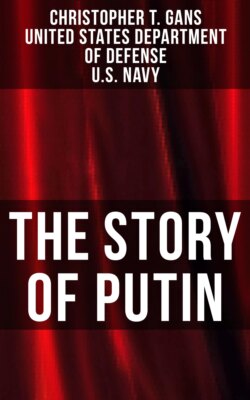Читать книгу The Story of Putin - United States Department of Defense - Страница 21
На сайте Литреса книга снята с продажи.
b. Balkans
ОглавлениеTable of Contents
As NATO expanded ever closer to the Russian homeland, the Yeltsin years also bore witness to a NATO willing to engage in alleged unilateral uses of force on the international scene, specifically in Southeast Europe during the Balkan wars spanning the 1990s. In his 2000 autobiography referencing both Kosovo and Chechnya, Putin adamantly refutes the right of any state to intercede in the internal affairs of another state, in violation of international law, even if under humanitarian auspices.1 Regarding NATO, or any Western-coalition-based organization, Putin, in his infamous Munich Speech in 2007, declared it unjust for any pre-emptive military action to occur against a sovereign state without the United Nation’s consent, a body that Russia has considerable leverage in. “The use of force can only be considered legitimate if the decision is sanctioned by the UN. And we do not need to substitute NATO or the EU for the UN.”2 Rather unsubtly, Putin intimates that Russia should have had a say and should continue to have a say in any use of force around the globe and that NATO or NATO-member states (i.e., the United States) acting otherwise cannot occur.
Russia, with Putin in the background, observed multiple non-UN mandated uses of force in the 1990s, especially in the Balkans. During the Bosnian crisis of 1993 — 1995, Russian intransigence persisted within the United Nations Security Council regarding expanding the UN mandate to employ military force against the Bosnian Serbs. The impetus for a military halt to the Bosnian genocide therefore shifted to NATO, which initiated armed action against the Serbs in 1995 absent further UN (i.e. Russian) authorization.3 Four years later, NATO action against Slobodan Milosevic’s Yugoslavia during the Kosovo crisis serves as the quintessential case of NATO aggression absent international mandate. Once again, Yeltsin’s Russia’s obstruction within the UN Security Council compelled NATO to assume the mantle of primary decision making organization on the Kosovo issue.4 The Yeltsin government considered NATO’s effort a unilateral attack against a sovereign state that had not attacked a NATO member. NATO’s reassurances that the alliance remained a purely defensive entity had been dashed.5
NATO had now effectively usurped the United Nations as the primary peacekeeping organization and “substitute” for the UN as Euro-region political arbiter.6 Russian attempts to admonish NATO for their unilateral action within the international community fell flat. A Russian-submitted UN Security Council resolution declaring Operation Allied Force (NATO’s Kosovo action) unlawful received only three supporting votes, two of them Russia’s and China’s.7 Russia’s power-grip and influence within the UN was now moot in light of a new U.S. dominated NATO willing to bypass the Security Council. Russia, nevertheless, continued to exercise its muscle within the UN in the aftermath. They ensured that any subsequent Kosovo-related resolutions never even faintly contained wording that could be construed as the international body condoning the NATO armed action. Only references to alleviating human suffering within common international laws pertaining to humanitarian interventions could pass the Security Council.8 Putin extensively details the late 1990s Balkan turmoil and the NATO action against Serbia over Kosovo as a rallying cry of anti-NATO/anti-Western sentiment within Russia, given how his country was not treated as an “equal partner.”9
An enlarged NATO that remains beholden to the United States, both of which only grew stronger in the aftermath of the Soviet collapse, now proved willing to employ military force which it had not done in its entire Cold War existence. Repeated snubbing by the West toward Yeltsin’s Russia over issues of partnership and security also contributed to consternation in Russia. Though seemingly benign in the eyes of the United States the and West, is there any confusion as to how such actions might irk an already cognitively pre-disposed anti-American individual like Putin into retaining if not permanently psychologically justifying his own anti-Americanism? And then, at the end of the 1990s, the lifelong anti-American Vladimir Putin would abruptly emerge from obscurity and become the leader of Russia.
1 Gevorkyan, First Person, 138.
2 Vladimir Putin, “Speech and the Following Discussion at the Munich Conference on Security Policy,” February 11, 2007, http://kremlin.ru/eng/text/speeches/2007/02/11/0138.shtml.
3 Ryan Hendrickson, Diplomacy and War at NATO: The Secretary General and Military Action after the Cold War (Columbia, Missouri: University of Missouri Press, 2006), 51, 55.
4 Ibid., 94 — 96.
5 Michael Mandelbaum, “A Perfect Failure: NATO’s War against Yugoslavia,” Foreign Affairs 78, no. 5 (Sept.-Oct., 1999), 7.
6 Rama S. Kumar, “From Kosovo to Georgia: The U.S., NATO and Russia,” Economic and Political Weekly 43, no. 36 (Sept 2008), 25.
7 Dino Kritsiotis, “The Kosovo Crisis and NATO’s Application of Armed Force against the Federal Republic of Yugoslavia,” The International and Comparative Law Quarterly 49, no. 2 (April 2000), 347.
8 Ibid., 358
9 Gevorkyan, First Person, 137.
